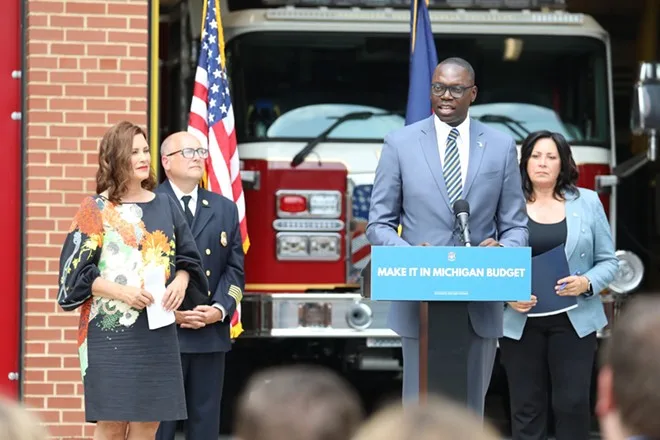
State of Michigan
Lt. Gov. Garlin Gilchrist II led the Racial Disparities Task Force, which was responsible for decreasing inequities in health care accessibility for marginalized communities.
Less than a month after the first COVID-19 cases were first reported in Michigan, health officials detected an unsettling pattern: A disproportionate number of the people getting infected and dying were Black.
It was early April 2020, and about 40% of the first 500 people who died from the coronavirus in the state were Black residents, who make up just 13.6% of the state’s population.
Gov. Gretchen Whitmer quickly appointed leaders from government, academia, health care, economics, public health, education, and the private sector to serve on the newly formed Racial Disparities Task Force. The group’s objective was to decrease racial inequities in health care accessibility and improve the long-term outcomes for marginalized communities.
On Wednesday, state officials toured the Bethel Baptist Church East Community Health Clinic in Detroit to highlight Whitmer’s $49.5 million investment in this year’s budget to implement the recommendations of that task force.
“Michigan’s COVID-19 Racial Disparities Task Force brought together dedicated public servants to tackle racial health disparities and save lives,” Lt. Gov. Garlin Gilchrist II, who led the task force, said Wednesday. “Now, our state budget builds on the work of the task force by investing in innovative approaches to grow access to affordable healthcare and serve Michiganders in communities across our state. It funds mobile health units that meet patients where they are and local healthy community zones that help more Michiganders lead healthy lifestyles. Governor Whitmer and I will keep working with anyone to build healthy, equitable, prosperous communities where everyone can thrive.”
To help close racial health equity gaps, Whitmer’s budget includes:
• $17 million for the Neighborhood Health Grant Program, which will transition 22 community-based COVID-19 testing sites into comprehensive health and wellness centers that offer services such as screenings for blood pressure, diabetes, and cholesterol, immunizations, COVID-19 and HIV/STI testing, and counseling.
• $16 million for pilot programs aimed at addressing the leading causes of health disparities in underrepresented communities, like a lack of health food and fitness opportunities.
• $7 million to continue developing mobile health units that fill gaps in access and care delivery.
• $2.5 million to support people with sickle cell anemia and help their families with counseling, support groups, and other assistance.
• $23 million to implement other task force recommendations and address other disparities in health care access.
“We are committed to addressing racial health disparities across the state of Michigan,” Elizabeth Hertel, director of the Michigan Department of Health and Human Services, said. “The budget builds on the important work of the Michigan COVID-19 Racial Disparities Task Force and continues investing hundreds of millions to close health equity gaps in communities across our state. Thank you to Lieutenant Governor Gilchrist, Governor Whitmer, and our legislative partners for prioritizing health and working hard to help more Michiganders lead healthy lives.”
State Sen. Sarah Anthony, D-Lansing, said this year’s fiscal budget was highlighted by Gilchrist’s “tireless commitment to addressing racial health disparities.”
“While other states continue to ignore the impact of systemic racism on communities of color, Michigan is a leader in efforts to address these issues head on,” Anthony said.
In February, the task force released its final report and concluded that the state had successfully closed the gap on COVID-19 racial disparities by expanding testing in marginalized communities; improving access to health care, coronavirus treatments, and vaccines; and distributing free personal protective equipment.
At the beginning of the pandemic, public health officials said Black people had higher mortality rates because of disparities in the health care system. Generations of racist housing and economic inequality have trapped many Black people in impoverished neighborhoods without adequate resources.
In Detroit, where more than a third of its population is impoverished and many are uninsured or underinsured, residents are far more likely to have pre-existing health conditions like diabetes, asthma, high blood pressure, heart disease, and obesity.
Health officials also said the infection rates were higher because contagious diseases often spread faster in lower-income areas because many people rely on public transit, live in close quarters, and have jobs without paid sick days. A disproportionate number of lower-income residents also work in the service industry, where employees are in close contact with the public.
“All Michiganders deserve access to quality health services,” state Rep. Christine Morse, D-Texas Township, chair of the House Appropriations subcommittee on Health and Human Services, said. “Unfortunately, communities and people of color often face additional and steeper obstacles to access those necessary services — that’s why it’s crucial we make investments to remove those barriers, so that services are equitably available to all Michiganders. From day one, I was glad the Task Force on Racial Disparities was created. Seeing these investments — many of which came out of the Department of Health and Human Services budget — being put into place makes me even more grateful.”
Subscribe to Metro Times newsletters.
Follow us: Google News | NewsBreak | Reddit | Instagram | Facebook | Twitter


